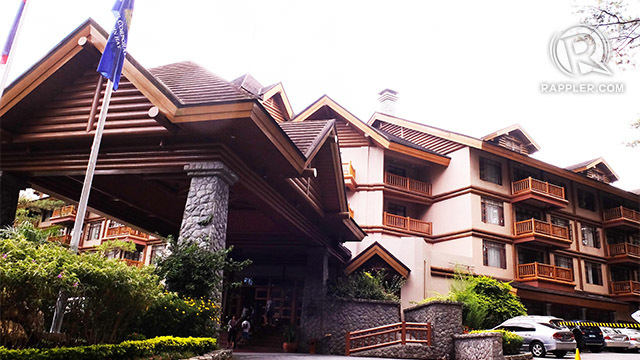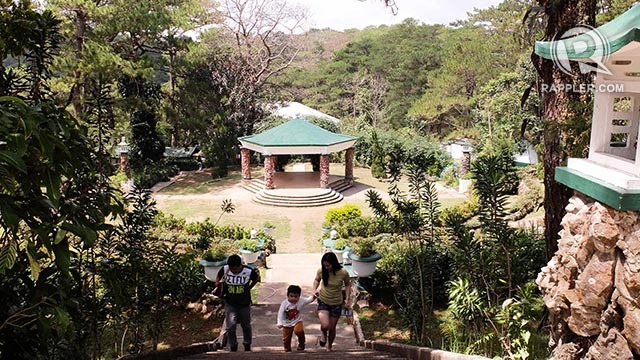Korean lessee sues CJHDevco
BAGUIO CITY—A Korean filed fraud charges against 11 board members of
the developer of Camp John Hay for allegedly deceiving him into leasing a hotel
unit that he may not be able to use for the next 50 years as promised.
 In an April 23 complaint with the Department of Justice (DOJ), Kim
Sung Hwan said he and his father, Kim Chang Sik, acquired a 50-year lease over
Suite No. 447 of Camp John Hay Suites from Camp John Hay Development Corp.
(CJHDevco) in December 2006 for P5.7 million.
In an April 23 complaint with the Department of Justice (DOJ), Kim
Sung Hwan said he and his father, Kim Chang Sik, acquired a 50-year lease over
Suite No. 447 of Camp John Hay Suites from Camp John Hay Development Corp.
(CJHDevco) in December 2006 for P5.7 million.
Kim claimed that the suite was delivered to him unfinished in August
2011 only.
He asked the DOJ to file criminal charges against Robert John
Sobrepeña, Ferdinand Santos, Enrique Sobrepeña Jr., Noel Cariño, James March
Thomson, Silvestre Bello, William Russel Sobrepeña, Raul Goco, Jose Nuñez,
Rafael Perez de Tagle Jr. and Laurito Serrano.
He accused the officials of “intentionally deceiving [the Kim family]
… through their scheme, making false pretenses … to collect payments, for
failing to deliver CJH Suite No. 447 on the promised schedule and of the
promised quality as agreed upon, and for misrepresenting that CJHDevco has the
right over the properties for 50 years.”
Kim Sung Hwan was among the 11 Koreans who inquired into
advertisements posted by the Bases Conversion and Development Authority (BCDA),
which contested the 50-year rental contracts that were marketed by CJHDevco.
The BCDA and CJHDevco are locked in a debt feud that spun out into
three legal suits early this year.
Antonio Yñiguez, CJHDevco executive vice president and chief operating
officer, had described the advertisements as a form of sabotage.
In a joint letter of inquiry to BCDA President Arnel Paciano Casanova
dated April 25, the Koreans said: “Several weeks ago, we were surprised to see
several press releases made by you and the CJHDevco over the issue of whether
or not the actual leasehold rights granted by you to CJHDevco were for 25 years
or 50 years.”
Concern
“We were very much concerned about this issue as we have purchased and
invested money on our properties, relying on CJHDevco’s representations and
assurances that we could make use of our properties until October 2046, with
the possibility of renewing our stay thereon,” they wrote.
They told the BCDA that they took out long-term lease contracts for
units at Camp John Hay Suites, Forest Cabins and lots offered by the firm’s
country, forest and golf estates projects.
Yñiguez on Sunday said the BCDA advertisements were not true. “The
[CJHDevco lease contract to develop the former American rest and recreation
baseland] is 25 years plus 25 years renewable at the option of the lessee. This
has to be honored by the BCDA since they were party to the original lease
contract in 1996,” he said.
“Four directors of the BCDA were [part] of the board of CJHDevco from
July 2008 to December 2011. Therefore, they knew everything that was happening
and everything was transparent,” Yñiguez said.
In his complaint, Kim said: “In all verbal and written representations
made by CJHDevco and its representatives, they intentionally deceived the
purchasers that they could sell properties inside Camp John Hay for use for 50
years or until 2046 to entice purchasers to pay them the purchase price or
lease consideration.”
“CJHDevco sold us CJH Suites Unit 447 for and in consideration of
P5,703,811,” Kim wrote in his affidavit. He said his father paid a P50,000
reservation fee on Dec. 29, 2006 for the unit upon the guarantee they would use
it six months after completing the payments. Frank Cimatu, with a report from
Vincent Cabreza, Inquirer Northern Luzon
Read more:
http://newsinfo.inquirer.net/189363/korean-lessee-sues-john-hay-developer#ixzz3bDO3BCXX
Follow us: @inquirerdotnet on Twitter | inquirerdotnet on Facebook
***
KOREAN FAMILY, EX CONGRESS LEADER’S FIRMS SUE JOHN HAY DEVELOPER FOR ESTAFA
By: Ace Alegre
Posted: 14-May-2012 / 2 years 51 weeks ago
"Leased John Hay Until 2021 Only, Not 2046?"
BAGUIO CITY – All eleven board members of the Camp John Hay
Development Corporation (CJHDevCo) are facing estafa lodged by a Korean family and three firms
owned by former House of Representatives leader for allegedly deceiving them
into leasing properties at the Camp John Hay they may not be able to use for
the next 50 years as promised.
In an April 23 complaint with the Department of Justice (DOJ), Kim
Sung Hwan said he and his father, Kim Chang Sik, “acquired” a 50-year lease
over Suite No. 447 of Camp John Hay Suites from CJHDevco in December 2006 for
P5.7 million.
Kim claimed that the suite was however only delivered to him
unfinished in August 2011.
He is now charging Robert John Sobrepeña, Ferdinand Santos, Enrique
Sobrepeña Jr., Noel Cariño, James March Thomson, Silvestre Bello, William
Russel Sobrepeña, Raul Goco, Jose Nuñez, Rafael Perez de Tagle Jr. and Laurito
Serrano for “duping him” into believing he can have the suite until 2046,
though the CJHDevCo only has a contract with the Philippine government for 25
years only starting 1996 or until 2021 only and not until 2046.
Kim accused the officials of “intentionally deceiving [the Kim family]
… through their scheme, making false pretenses … to collect payments, for
failing to deliver CJH Suite No. 447 on the promised schedule and of the
promised quality as agreed upon, and for misrepresenting that CJHDevco has the
right over the properties for 50 years.”
Kim was among the 11 Koreans who inquired into advertisements posted
by the Bases Conversion and Development Authority (BCDA), which contested the
50-year rental contracts that were marketed by CJHDevco.
Also, three firms owned and represented by former House of Rep.
assistant majority floor leader Eric Singson – Stern Realty and Development
Corporation, Meehan Cellars, Inc. and Ilocos Coastal View Resorts have sued
Sobrepena, CJHDevCo marketing officer Shean Bedi, Thelma Launo and Alfredo
Yniguez III for estafa for duping the firms into believing they can use the
over P50 million worth of land it acquired from the developer for 50 years or
until 2046 also as promised.
Singson said like the Korean family, they were convinced that the
acquired properties where the Le Monet hotel located along the Eco-Village area
will be used until 2046.
But the BCDA has warned the CJHDevCo only has until 2021.
The BCDA and CJHDevco are locked in a debt feud that spun out into
three legal suits early this year.
“We were very much concerned about this issue as we have purchased and
invested money on our properties, relying on CJHDevco’s representations and
assurances that we could make use of our properties until October 2046, with
the possibility of renewing our stay thereon,” the Koreans claimed in their
complaint.
They told the BCDA that they took out long-term lease contracts for
units at Camp John Hay Suites, Forest Cabins and lots offered by the firm’s
country, forest and golf estates projects.
But Yñiguez, CJHDevCo CEO said the BCDA advertisements (in the
newpapers) were not true. “The [CJHDevco lease contract to develop the former
American rest and recreation baseland] is 25 years plus 25 years renewable at
the option of the lessee. This has to be honored by the BCDA since they were
party to the original lease contract in 1996,” he said.
“Four directors of the BCDA were [part] of the board of CJHDevco from
July 2008 to December 2011. Therefore, they knew everything that was happening
and everything was transparent,” Yñiguez said.
In his complaint, Kim said: “In all verbal and written representations
made by CJHDevco and its representatives, they intentionally deceived the
purchasers that they could sell properties inside Camp John Hay for use for 50
years or until 2046 to entice purchasers to pay them the purchase price or
lease consideration.”
“CJHDevco sold us CJH Suites Unit 447 for and in consideration of
P5,703,811,” Kim wrote in his affidavit. He said his father paid a P50,000
reservation fee on Dec. 29, 2006 for the unit upon the guarantee they would use
it six months after completing the payments.
(May also be seen at
www.baguiocity.com/news_article/korean-family-ex-congress-leader%25E2%2580%2599s-firms-sue-john-hay-developer-estafa+&cd=1&hl=en&ct=clnk&gl=ph)


















.jpg)



